This month, I have been virtually rollerblading with a woman who puts the “R” in resilience. Her name is Nathalie Jacob and she’s the author of “8: Rediscovering Life After a Brain Tumor.“
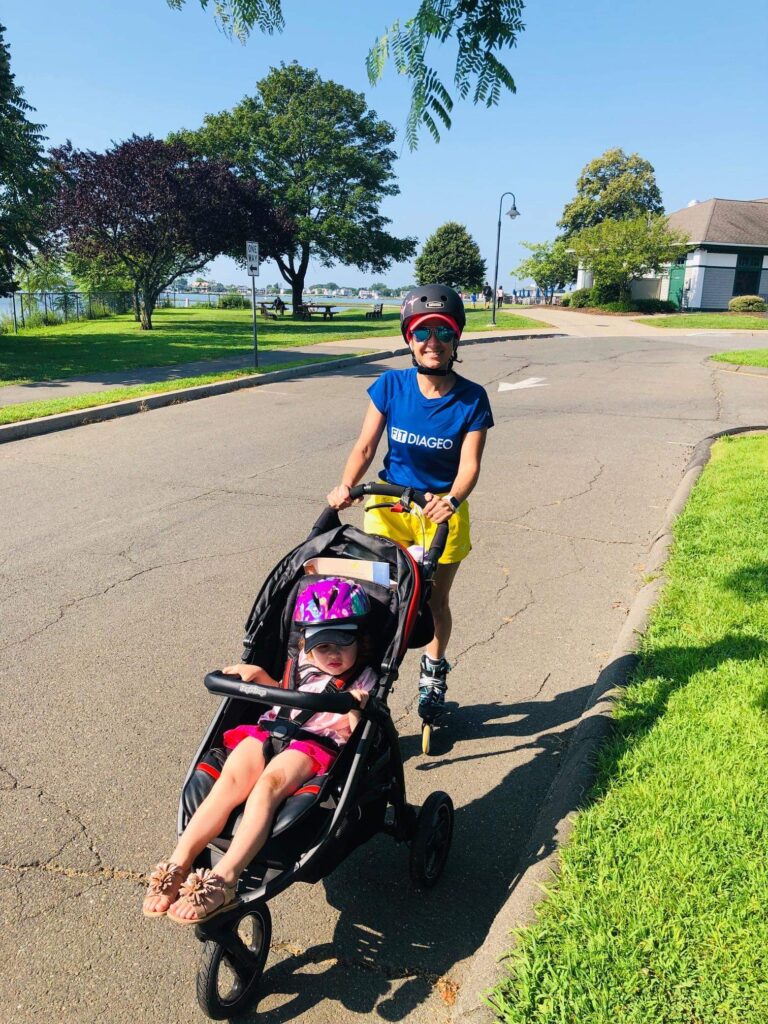
Okay, you caught me…who do I think I’m kidding? We ARE brain surgery survivors after all and that would be some serious multi-tasking. So, here’s the deal; Nathalie was rollerblading and I was rollerskating. Nonetheless, we managed to complete our interview.
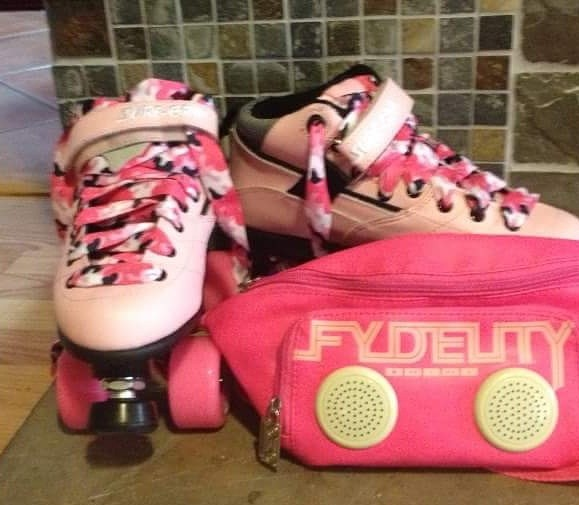
Hi Nathalie. Thank you for your for agreeing to this blog interview with me about your book, “8: Rediscovering Life After a Brain Tumor.“
It’s been a while since I first read 8, so I needed to take some time to go back and review it again in order to formulate your questions, but let me tell you… I’m glad I did because I got even more out of your book the second time around! You incorporated so many important messages and pearls of wisdom. You described originally writing the book as a way to exercise your brain and then two years later completing it for your precious daughter, Nicole. Thank you for finishing your book and sharing it with the world.
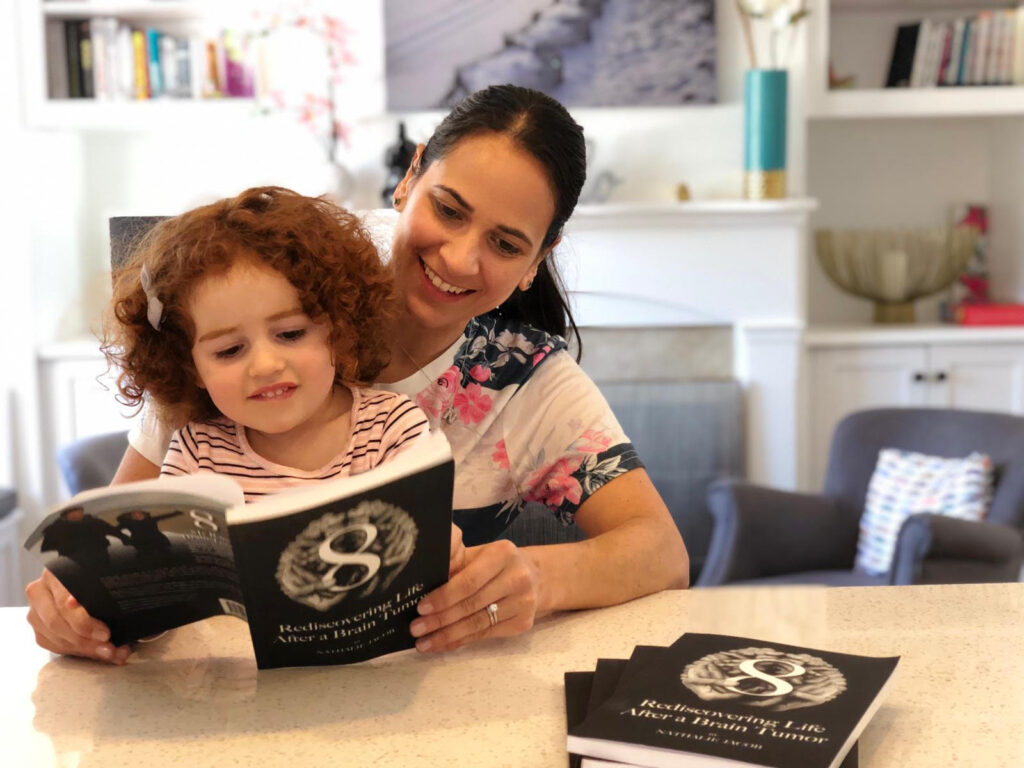
From what I’ve read, you were diagnosed with a rare intraventricular meningioma (a “benign” brain tumor). It was discovered incidentally after a skiing accident in 2015 at the age of 34. The subsequent craniotomy left you with permanent disabilities including the loss of your peripheral vision (which you signed on for) and cognitive deficits (which you did not sign on for).
As a fellow brain tumor survivor, I could relate to so much of what you wrote about. Your story brought back a lot of memories for me. I think our tumors were located in similar areas so we experienced similar issues following our brain surgeries. For instance, I had to relearn how to read and write as well and had trouble communicating for the first few months following my craniotomy too. I chuckled when at one point you expressed, “I was trying to say ‘pillow.’ I wanted my pillow adjusted, but I was looking at the curtains, so my brain had gone off on its own.” Since my right hand would often do the same (for example, I recall my right hand picking up a fork from the table to eat dinner before I could sit down at the table) I used to say “my right hand has a mind of its own.”
Another thing I found humorous was when you described trying to get better at cooking during your recovery. I did the same thing! I can’t believe what a brain workout something like cooking is when you aren’t used to it.
I went ahead and borrowed the following description about you from your website since it summarizes your international experience better than I ever could:
Nathalie Jacob was raised in Colombia, went to high school in France, and later moved to the United States. She is trilingual in English, Spanish, and French.
Nathalie studied business administration at the Universidad de los Andes in Colombia and received her master’s in business administration from IE Business School in Spain. She spent ten years working in high-level marketing jobs for Fortune 500 companies in five different countries. In her spare time, she enjoyed sailing and won several national championships.
The aftereffects of a brain surgery left Nathalie disabled and unable to work. She has done three voluntary jobs since, until the birth of her first child. She is now focusing on being the best mother she can be to her baby daughter, Nicole.
Wendy: I love the title of your book and the design of the cover. You spoke about how everything looked like the number “8” to you following your craniotomy. Can you take us through that first walk in the hospital halls after your surgery?
Nathalie: Of course. And, thank you too! So, when I woke up from the surgery, the doctors asked me to walk around just to make sure my physical body was working okay (other than my eyesight). When I started walking they asked me what number do you see on that door, and I said “8” and we kept walking and they asked me what number do you see on this door, and I said “8.” I honestly saw “8” on every single door! And nobody corrected me so I really thought I was seeing the number “8’” on every door! Next, they asked me, so on a threshold from 0-10 what level is your pain right now? My answer was “8.” Then they asked me, what year I was born and I said the “1800’s.” I do not know why but I saw everything as an “8.” And, on that walk through the hospital, I was just genuinely naive. I wasn’t understanding the severity of the situation. I was just innocently walking thinking that everything I was seeing was making sense. So that walk was interesting. After that, I realized how shocked the doctors and my family members (that were walking with me) must have been. But, for me, it was just a normal walk describing my reality as I was seeing it.
Wendy: Did you ever find out the reason why you were seeing “8” everywhere or why your brain transformed every response you gave to a number that included “8”?
Nathalie: Nope, there’s no reasonable explanation for what was causing me to see the “8’s.”
Wendy: Wow! That is surreal. On another note, what did you mean when you wrote, happiness can be simple, and it’s actually easier when it’s simpler?
“Happiness can be simple, and it’s actually easier when it’s simpler.”
Nathalie: Very, very good question. What I meant when I said happiness could be simple was because in our normal everyday lives happiness takes so much – you know? We want that car, we want that purse, we want so many material things that maybe we can’t get. We’re also (especially women, I think) overthinking everything and over-analyzing everything and we wonder, how can we be happier… what are we missing? We get all analytical about all of this.
So to answer your question why do I think happiness can be simpler and why did I experience the simpler happiness at that moment, it’s because my brain was very basic and I was really truly enjoying the basic things in life like listening to birds tweet. Just walking outside of my house (with some help obviously) and just listening… listening to nature. Rediscovering nature was a beautiful experience. We are so used to nature and its beauty that we take it for granted. It almost disappears from our eyes when we see it in our daily lives. I had the luxury of enjoying nature as little children do but as an adult. And, just for example… coloring in coloring books. My brain was the brain of a toddler and I found it spectacular how a brain can be like two-years-old when I was 35 at that moment. And, I realized that happiness can be very, very simple if we let it and I think society has made it so complicated.
“Rediscovering nature was a beautiful experience. We are so used to nature and its beauty that we take it for granted. It almost disappears from our eyes when we see it in our daily lives. I had the luxury of enjoying nature as little children do, but as an adult.”
And, even as I’m saying these words now, I’m honestly falling back into the trap of wanting more things and making happiness more complicated again. But, happiness is simple. Happiness is love, happiness is giving, happiness is sharing, and happiness is just really remembering that if you have the basics in life that’s enough to be happy. The rest is just decoration. We don’t need really need any of the stuff that modern society tells us we need. In a weird way, we’re talking about this with the global pandemic of the Corona Virus and if we realize how happy we can be with simple things we probably will be happier in life.
Wendy: So true. This pandemic is bringing humanity back to life’s basic necessities for sure!
Wendy: I believe your tumor was located in your left temporal lobe. As you wrote, “with English as my second language, I misinterpreted the word “temporal” for “temporary” and therefore thought that my side effects were temporary that they wouldn’t be there for life. So I decided to enjoy the moment, as I would only be compromised for a period of time and then go back to normal.” What happened when you realized the side effects weren’t actually temporary?
Nathalie: When I realized the side effects weren’t going to be temporary, it was really, really hard! I realized it in two or three different phases and honestly, I was devastated. I could not stop crying. I didn’t want to admit it to myself to the point that I didn’t want to say the words out loud because saying them out loud meant that it was a reality and that the side effects were going to last longer or for life. It was very, very hard. I’m going to say the darkest moments of all my experience occurred when I realized my deficits weren’t going to be short-term.
Wendy: As a reader, I genuinely appreciated your positive attitude though, and the way you approached your deficits (even if it was because at first, you thought they were only temporary). Following the surgery, you were like a child playing and discovering things for the first time. In one scene (while you were still in the hospital, I believe) you described your vision this way: “…in the meantime, the child’s game of peekaboo was a great amusement, as Antonella jumped in and out of my blind spot.”
“In the meantime, the child’s game of peekaboo was a great amusement, as Antonella jumped in and out of my blind spot.”
You also wrote, “I found the fact that I couldn’t read or write intriguing and entertaining. Just some hours before, everything was normal, and now I couldn’t read or write. Yet, interestingly enough, I could still speak my three languages, Spanish, English, and French, perfectly.”
I thought your ability to look at your experience from that perspective was remarkable. Where do you think your ability to think like that comes from?
Nathalie: I have always been a positive person in life and I think the reason why is because I’ve always had a difficult life. I mean everybody has in a way an easier or a more difficult path life so I’m not saying I’ve had the most difficult life, no. But, I haven’t had the easiest life either. I’ve had several other challenges and difficult moments in life that have made me a resilient person. Obviously, this has been the challenge that has been the toughest of them all. But, I think little by little when you stumble and you learn how to stand back up, you become a person that gets trained on standing up again. Which at the end is the definition of resilience. So in a way, I think the fact that when I was going through all this and even though I was very much a toddler at the moment, I was still just enjoying the moment because ultimately there were only two ways of seeing this and living through it. I could have either been absolutely devastated which wasn’t going to help anyone, nor my recovery or anything. Or, I could try and enjoy the moment because it was the healthiest way to act for my own health and for my own mindset. I think that’s why I tried to be very positive.
” I’ve had several other challenges and difficult moments in life that have made me a resilient person.”
Wendy: I also found it interesting that prior to the discovery of our brain tumors we both became workaholics as a way to cope with painful emotions. You wrote, “I wouldn’t have signed up for the surgery if I had known that my cognitive brain—meaning my intelligence, everything that defines me, was at risk. I am not a hotshot; I am not a supermodel. The only things that defined me are my brain and my passion for work.” We both had careers we loved and we both thought we found what we would be doing for the rest of our working lives. And, we both lost our jobs and had our careers cut short. You wrote about having the mental flexibility to redefine ourselves after catastrophic events. It took me a few years to finally accept my “new normal.” What else helped you to accept your “new normal”?
“I wouldn’t have signed up for the surgery if I had known that my cognitive brain—meaning my intelligence, everything that defines me, was at risk. I am not a hotshot; I am not a supermodel. The only things that defined me are my brain and my passion for work.”
Nathalie: So, I think that to accept my new normal…definitely being a mother helped me. I wasn’t one before. It’s not like I was one and then it continued. I wasn’t one before so I think just as you know maternal and paternal love is beyond explicable and obviously that wave of love overpowered everything and of course brought me a lot of happiness and helped me—helped me to find a new normal because being a mom wasn’t previously normal for me. Second, I think because I was lucky enough to have to move states I had a new life anyway per se. I believe all those changes helped me in general to change but honestly, it took some time. It took some time to accept the fact that I could not work anymore.
In addition to being a mom, the other thing that really helped me was finding a new passion. And, my new passion was helping others. In my town, of Westport, Connecticut I started to volunteer in three organizations while I had the time before I was a mom. Then after I became a mom, I decided to create three new Facebook groups to help the community around me they are:
- Westport Stay At Home Moms
- Westport Women
- Tumores Cerebrales
And each of these groups has 500 or more members. These Facebook groups have really brought me a lot of happiness because through them I’ve helped a lot of people in three different ways, even with my deficiencies.
Westport Stay At Home Moms has helped a lot of moms who previously had no other way to meet new friends and connect with their newborns, babies, or toddlers. And, through that group, I have made amazing friends and so has my daughter.
Westport Women helps women who operate businesses from their homes to advertise for free because they are all trying to succeed and as we know succeeding in business is not really easy.
Tumores Cerebrales has been helping Spanish speaking brain tumor survivors that had no way to connect. I started that group after I began to see that some people would post in Spanish but almost no one would reply to them. So I was thinking, ‘geez is there no group for brain tumor survivors in Spanish?’ And, I looked it up and to my surprise there was none! So I created one for Latin America. Little by little survivors from Spain started joining so I realized there wasn’t anything in Spain either so I changed the name to just Brain Tumors (in Spanish).
Wendy: That is so inspiring, Nathalie!
Wendy: I appreciated the amount of focus you put on brain fatigue in your book. That is a very big deal for so many brain tumor survivors. I think you described it best when you and your husband went on a short trip with a group of friends and you wrote, “…we had a nice relaxing weekend of chatting, fire time, eating, and walking along the beach. The first day I felt normal. The following day, boom! That’s when the brain fatigue kicked in. I hadn’t realized how much of a toll keeping up with conversations with people for more than a couple of hours would take on me the next day. I couldn’t even speak in the car on the way home. It took me three or four days to recover as I was brain-dead.” This is very important as so many of our disabilities are invisible and since we look “normal” people can often forget we are struggling. What tips can you share about managing brain fatigue?
Nathalie: Oh, brain fatigue. I find it so interesting how difficult it is for people to believe it’s true. Honestly, I’ve been disabled for years now and one of the biggest reasons is that. So many patients have this as a side effect and yet the common world does not even believe us. To manage my fatigue…well to start…I’m lucky because I don’t work. I just spend a lot of hours in the house. A LOT OF HOURS IN THE HOUSE. Like 90 percent of my time is in the house just relaxing. If I go and see friends I’m exhausted the next day and I know that so to manage my fatigue I pace myself through my calendar. I normally just see one friend and then I don’t see anyone the next day and when I do see that friend it’s only for a couple of hours maximum. I basically space my activities. On the weekends my husband, Simon, takes over with Nicole so I can recover. A lot of my recovery takes place on the weekends. And, there’s a lot of typical activities he takes over, for example, he’s the one who goes food shopping, he’s the one who takes on a lot of the activities so I don’t get exhausted/brain fatigued.
Wendy: Can I just tell you how much I can relate to everything you just said? I can relate to every-single-word! It’s like you were describing my life. I have learned over time to conserve my energy as well. It’s hard and sometimes I still overdo it and then I end up paying for it. I noticed some of the other residual issues we both share include: sensitivity to light, not being able to tolerate the sun, an aversion to loud sounds, and unable to cope with crowds as well.
Wendy: At the end of your book you have a chapter called, Lessons and Advice where you offered suggestions such as:
- be grateful and thankful
- don’t expect anything from others
- laugh twice as much as you cry
- learn to forgive
- get life insurance while you are healthy and young
- don’t expect your family and friends to understand what you are going through
- ask questions, and research prior to making any decisions
- get a second opinion
- plan items prior to going into surgery
- write down on a piece of paper all your passwords, email, etc…
Is there anything else you would add to that list or emphasize at this time?
Nathalie: Maybe the only thing I would add to my suggestions is now that my surgery was five years ago, I would just say prepare for a long path. I don’t mean physical because the physical depends on the person. I mean the mental (the psychological) recovery path – I think it’s longer than anybody could expect. So I would say get a lot of energy and a lot of positivity inside of you because it’s longer than we think and it’s longer than we expect and I think it’s good to know it. Maybe it’s just my personal experience but from talking to other brain tumor survivors it’s definitely psychologically harder than we think even for people who are positive and even for people who don’t suffer as many physical side effects. It’s not an easy path it’s long–it’s a marathon–and I think just knowing that will get you more prepared for the path once you’re in it. And, always try to live it with a smile on your face especially because recovery takes so long (otherwise it’s going to be a nightmare instead of something else).
Wendy: Thank you again for chatting with me, Nathalie. Is there anything else you would like to add before we remove our rollerblades/skates?
Nathalie: Oh yes, a lot of the people who have read the book, in general, have loved the chapter that Simon wrote and I think it’s very important for us to understand that this a path for both the patient and the caregiver(s). This will not only change the patient’s/survivor’s life but it will also change the caregiver’s life. It has changed my husband’s life completely. Caregivers are honestly the true heroes, We need them beside us and it’s easy for them to support us at the beginning because the love is there but little by little it becomes more difficult for them as time starts passing by because they realize how much more support we need not only in the first six months and first few years but actually we will continue to need for the rest of our lives. So, be kind and loving to your caregivers because they are honestly the true heroes. It’s not the survivor, it’s the people who are taking care of us and supporting us throughout the process. He (Simon) is my hero and I will be forever grateful.
Wendy: Again, I can completely relate and couldn’t agree more. In fact, I just rolled up to my husband (who has been there for me every step of the way of my brain tumor journey as well) and gave him a great big hug and I thanked him and told him how much I love him.
Wendy: Oh, and, I noticed your book is currently available in English and Spanish. Will there be a French version as well?
Nathalie: Well, I wish it would be in French too but, to be honest, I do not have the budget. I wrote it in English first and tried translating it to Spanish myself (which was impossible even though Spanish is my first language). My goodness translating is really an art. Even though I speak the language when I tried it myself it completely lost the sense and the feeling so Antonella very generously offered to pay for the translation in Spanish. But I do not have the funds at this time to translate it to French so unfortunately, it’s not something I can afford at the moment. So, if anyone wants to volunteer to translate it that will be amazing but if not it will stay in those two languages.
“I feel I have rediscovered life after a brain tumor, a new life and I love it!”
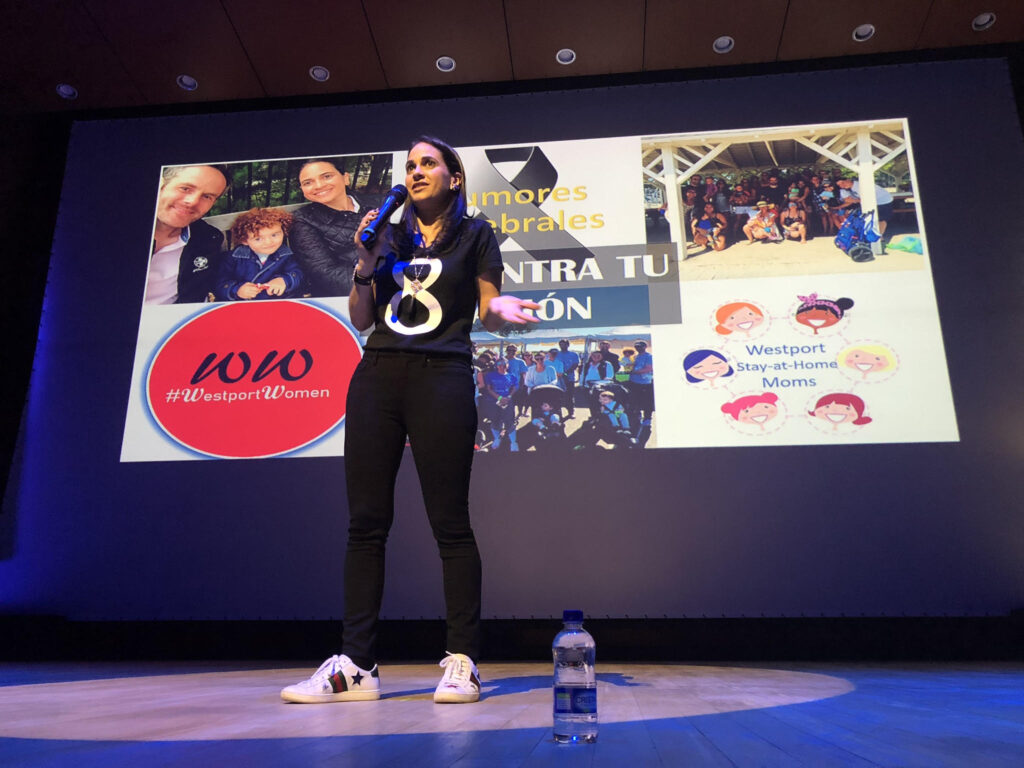

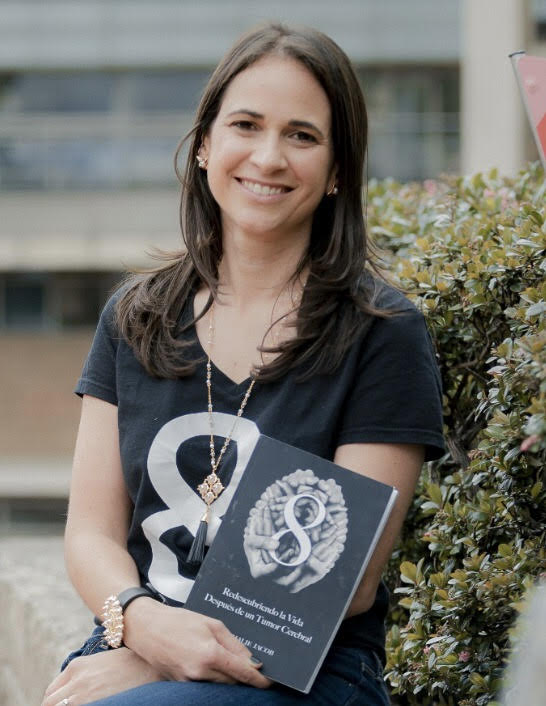
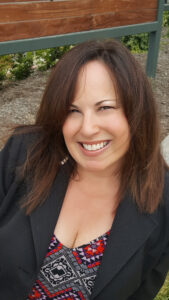 Hello. My name is Wendy and I’m a recovering workaholic. I'm also a brain tumor/cancer survivor.
The purpose of this blog is to share my experiences, memories, resources, and self-discoveries as I continue to transform from a workaholic into a more balanced person. I have read several books and stories about others who have had similar experiences
Hello. My name is Wendy and I’m a recovering workaholic. I'm also a brain tumor/cancer survivor.
The purpose of this blog is to share my experiences, memories, resources, and self-discoveries as I continue to transform from a workaholic into a more balanced person. I have read several books and stories about others who have had similar experiences 